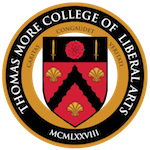
The Thomas More College of Liberal Arts
Six Manchester Street
Merrimack, NH 03054
Phone: (603) 880-8308
Fax: (603) 880-9280
Contact via email
Copyright © 2024 Thomas More College of Liberal Arts. All rights reserved.
Having honed the senses and the mind, the students are ready in their third year to progress to properly philosophical courses, in which they are challenged to ask the kinds of questions that the wise have always pondered: What is nature? What is motion? What is life? What is the soul? In what does human happiness consist? What is the relationship of the individual to the community? Nature & Motion, On the Soul, and the two courses On the Good Life constitute the rigorous and systematic pursuit of truth called for by John Paul II’s encyclical Fides et Ratio. The students in these classes enter into an extended conversation with Aristotle and his precursors, including Plato and the Pre-Socratics, and benefit widely from the contribution of the wise through the ages, from St. Augustine to Benedict XVI. At the end of the ascent from the senses to what can only be contemplated by the mind comes First Philosophy, or Metaphysics. In their fourth-year, while the students are reflecting upon the theological writings of St. Augustine and St. Thomas Aquinas, they also reach the term of natural inquiry with the study of “being” in itself. Here the ascent towards wisdom is particularly steep, but the summit affords clear, wide-ranging views for those with the courage to try its slopes.
(3 credits during third year of studies)
An inquiry into the principles, causes, and elements of natural things, those with an intrinsic source of motion and rest. Readings include selections from the Pre-Socratics, Aristotle’s Physics, and Descartes’ Discourse on Method. The course culminates in the comparison of modern and Aristotelian views of nature and motion.
(3 credits during third year of studies)
A study of living things, their distinctive activities of nutrition, growth, generation, perception, and self-motion, the powers that make possible those activities, and the principle of those powers, the soul. The course will culminate in a consideration of the human soul and its distinctive activities of knowing and willing. The principal text will be Aristotle’s On the Soul, against the background of pre-Socratic, Hippocratic, and Platonic texts, and together with passages from Aristotle’s biological works. Attention is also given to challenges posed to the traditional understanding of the soul by Descartes and other modern thinkers.
(3 credits during third year of studies)
A study of human action, the virtues as principles of good human action, friendship as its sustaining context, and happiness as its ultimate end. The principal text will be Aristotle’s Nicomachean Ethics, together with brief selections from Augustine, Aquinas, and John Paul II.
(3 credits during third year of studies)
A study of human life in common. To be considered are the kinds of community—family, household, city, and nation—the kinds of rule appropriate to each, the common goods to which each is ordered, the kinds of regime and what preserves them, and the best regime and way of life for the political community. Texts include Aristotle’s Politics and selections from Augustine, Aquinas, and the tradition of Catholic social thought. An introduction to the principles of economics and the political effects of various economic theories is also given.
(3 credits during fourth year of studies)
The culmination of philosophical inquiry, what Aristotle calls “first philosophy”—the study of being qua being and its causes. The principal texts will be Aristotle’s Metaphysics together with readings by his modern critics and interlocutors (e.g., Hume, Kant, Heidegger).

The Thomas More College of Liberal Arts
Six Manchester Street
Merrimack, NH 03054
Phone: (603) 880-8308
Fax: (603) 880-9280
Contact via email
Copyright © 2024 Thomas More College of Liberal Arts. All rights reserved.